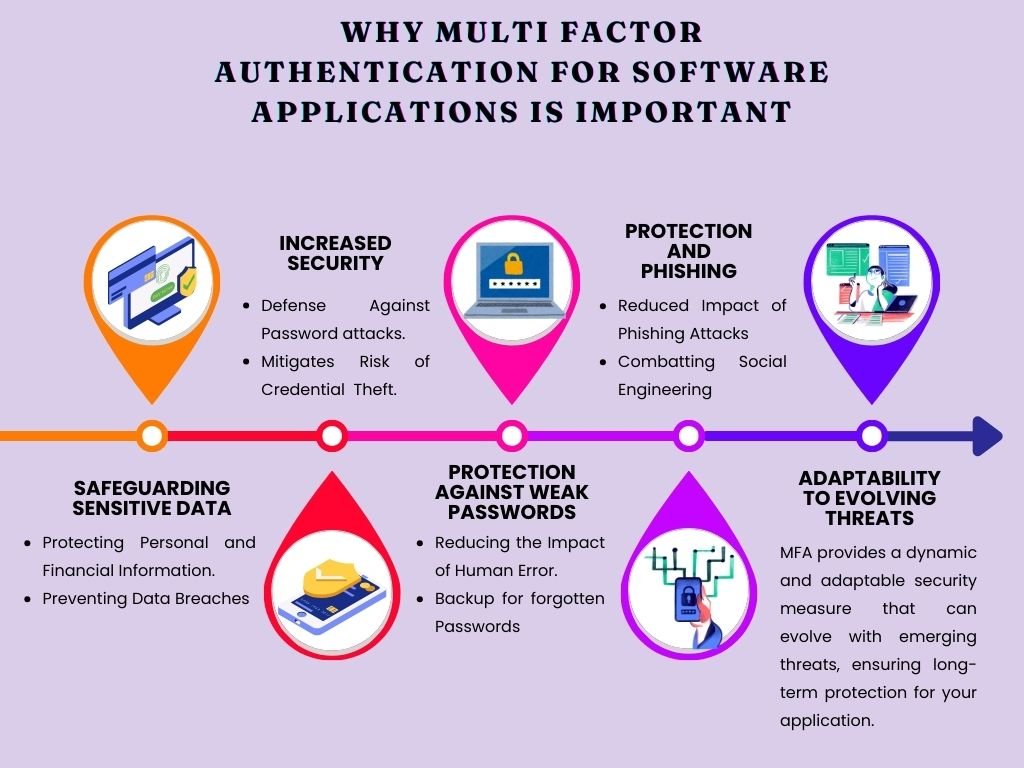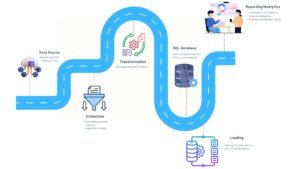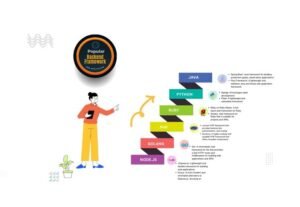Implementing Multi-Factor Authentication (MFA) in your software applications is crucial for several reasons, primarily related to enhancing security and protecting user data. Here’s why MFA is important:
1. Increased Security
- Defense Against Password-Based Attacks: Passwords alone are often weak, easily guessed, or compromised through phishing, brute force attacks, or data breaches. MFA adds an extra layer of security, ensuring that even if passwords are compromised, attackers cannot access the system without additional verification.
- Mitigates Risk of Credential Theft: With MFA, attackers need more than just a password to gain access. They would also need access to the user’s second factor, such as a physical token, a mobile device, or a biometric scan, making unauthorized access significantly more difficult.
2. Protection Against Phishing and Social Engineering
- Reduced Impact of Phishing Attacks: Even if a user falls victim to a phishing attack and reveals their password, MFA can prevent the attacker from accessing the account since they won’t have the second factor required for authentication.
- Combatting Social Engineering: MFA provides an additional safeguard against social engineering tactics, where attackers manipulate individuals into divulging confidential information.
3. Safeguarding Sensitive Data
- Protecting Personal and Financial Information: For applications handling sensitive user data, such as personal identifiable information (PII), financial details, or medical records, MFA is essential to prevent unauthorized access and data breaches.
- Preventing Data Breaches: By requiring multiple factors to authenticate, MFA helps prevent data breaches that could result from compromised credentials, protecting both the organization and its users.
4. Reducing the Impact of Human Error
- Safeguarding Against Weak Passwords: Users often create weak passwords or reuse passwords across multiple sites. MFA compensates for these human errors by adding an additional layer of security, reducing the risk posed by poor password practices.
- Backup for Forgotten Passwords: Even if a user forgets their password, having a secondary authentication method can help them regain access without compromising security.
5. Cost-Effective Security Measure
- Cost-Benefit Analysis: The cost of implementing MFA is often outweighed by the potential savings from avoiding security breaches, fines, and loss of customer trust. MFA serves as a cost-effective way to significantly enhance the overall security posture of your application.
- Reduces the Need for Frequent Password Changes: With MFA, the burden of frequent password changes can be reduced, as the additional layers of security mitigate the risk of password-based attacks.
6. Future-Proofing Security
- Adaptability to Evolving Threats: As cyber threats continue to evolve, relying solely on passwords becomes increasingly risky. MFA provides a dynamic and adaptable security measure that can evolve with emerging threats, ensuring long-term protection for your application.
Incorporating MFA into your software applications is not just a best practice; it’s becoming a necessity in today’s cybersecurity landscape. By requiring multiple forms of authentication, MFA provides a robust defense against unauthorized access, protects sensitive data, and helps maintain user trust, making it an essential component of modern software security strategies.





Thanks for sharing. I read many of your blog posts, cool, your blog is very good. https://accounts.binance.info/en-IN/register-person?ref=UM6SMJM3
Your article helped me a lot, is there any more related content? Thanks!
Your article helped me a lot, is there any more related content? Thanks!
Can you be more specific about the content of your article? After reading it, I still have some doubts. Hope you can help me.
I don’t think the title of your article matches the content lol. Just kidding, mainly because I had some doubts after reading the article.
Thank you for your sharing. I am worried that I lack creative ideas. It is your article that makes me full of hope. Thank you. But, I have a question, can you help me?
Your point of view caught my eye and was very interesting. Thanks. I have a question for you.
Thank you for your sharing. I am worried that I lack creative ideas. It is your article that makes me full of hope. Thank you. But, I have a question, can you help me?
where to buy cheap clomiphene no prescription says: can you get cheap clomiphene online can i buy generic clomid tablets where to get generic clomid tablets generic clomid online clomiphene 50mg for sale cost generic clomiphene without rx
I’ll certainly bring back to be familiar with more.
More articles like this would pretence of the blogosphere richer.
azithromycin 500mg for sale – order sumycin 500mg generic buy metronidazole generic
semaglutide 14mg without prescription – periactin us order periactin 4mg
domperidone 10mg generic – buy sumycin 250mg for sale order flexeril 15mg without prescription
purchase inderal pill – order methotrexate 10mg online methotrexate generic
purchase amoxil pills – valsartan 80mg drug combivent cheap
zithromax cheap – order tinidazole 500mg without prescription buy generic bystolic over the counter
buy generic clavulanate – atbioinfo order ampicillin online
esomeprazole 40mg capsules – https://anexamate.com/ buy esomeprazole online cheap
oral warfarin 5mg – https://coumamide.com/ order losartan online
order meloxicam 7.5mg for sale – swelling buy cheap meloxicam
purchase prednisone online – https://apreplson.com/ prednisone 5mg brand
top erection pills – fastedtotake.com ed pills gnc
cheap amoxicillin without prescription – buy amoxil cheap buy amoxil for sale
Your point of view caught my eye and was very interesting. Thanks. I have a question for you.
buy generic forcan online – https://gpdifluca.com/# diflucan for sale online
Thank you, your article surprised me, there is such an excellent point of view. Thank you for sharing, I learned a lot.
cheap cenforce – https://cenforcers.com/# cenforce sale
ranitidine 300mg over the counter – buy ranitidine without a prescription order ranitidine for sale
what is cialis used to treat – what is the active ingredient in cialis buying generic cialis online safe
More posts like this would make the blogosphere more useful. accutane presentacion
sildenafil citrate 50mg price – viagra 50 buy sildenafil citrate tablets 100mg
Can you be more specific about the content of your article? After reading it, I still have some doubts. Hope you can help me.
Thanks on sharing. It’s top quality. https://buyfastonl.com/isotretinoin.html
This is the amicable of topic I enjoy reading. https://ursxdol.com/prednisone-5mg-tablets/
I don’t think the title of your article matches the content lol. Just kidding, mainly because I had some doubts after reading the article.
Thank you for your sharing. I am worried that I lack creative ideas. It is your article that makes me full of hope. Thank you. But, I have a question, can you help me?
More posts like this would bring about the blogosphere more useful. this
Can you be more specific about the content of your article? After reading it, I still have some doubts. Hope you can help me.
This is the gentle of writing I in fact appreciate. https://aranitidine.com/fr/ivermectine-en-france/
Can you be more specific about the content of your article? After reading it, I still have some doubts. Hope you can help me.
More articles like this would pretence of the blogosphere richer. https://ondactone.com/product/domperidone/
Thanks for sharing. It’s outstrip quality.
celecoxib canada
Thank you for your sharing. I am worried that I lack creative ideas. It is your article that makes me full of hope. Thank you. But, I have a question, can you help me? https://www.binance.info/sk/register-person?ref=OMM3XK51
Your point of view caught my eye and was very interesting. Thanks. I have a question for you.
This website exceedingly has all of the low-down and facts I needed adjacent to this subject and didn’t identify who to ask. http://web.symbol.rs/forum/member.php?action=profile&uid=1171369
order dapagliflozin without prescription – this dapagliflozin order
xenical cheap – buy orlistat pills for sale orlistat 120mg us
Thanks for sharing. I read many of your blog posts, cool, your blog is very good.
Thanks for sharing. It’s first quality. http://bbs.51pinzhi.cn/home.php?mod=space&uid=7111816
Your article helped me a lot, is there any more related content? Thanks!
Thanks for sharing. I read many of your blog posts, cool, your blog is very good.
Your point of view caught my eye and was very interesting. Thanks. I have a question for you.
Thank you for your sharing. I am worried that I lack creative ideas. It is your article that makes me full of hope. Thank you. But, I have a question, can you help me?
Can you be more specific about the content of your article? After reading it, I still have some doubts. Hope you can help me.
You can keep yourself and your dearest nearby being wary when buying medicine online. Some pharmaceutics websites manipulate legally and sell convenience, secretiveness, cost savings and safeguards as a replacement for purchasing medicines. buy in TerbinaPharmacy https://terbinafines.com/product/pyridium.html pyridium
The sagacity in this ruined is exceptional. buy tamoxifen 10mg generic
More articles like this would make the blogosphere richer.
I don’t think the title of your article matches the content lol. Just kidding, mainly because I had some doubts after reading the article.
Can you be more specific about the content of your article? After reading it, I still have some doubts. Hope you can help me.
Getting the jljl55download app was a breeze. No hassle, no weird permissions. Just straight to the games. Worth the download if you’re looking for some fun. jljl55download
Hey, has anyone checked out rrs88 lately? I’ve been having some decent luck there with the slots. The bonuses could be a little better, but overall, it’s a solid platform. Worth a look if you’re after a new spot to play. Check it out: rrs88
Okay, okay, hear me out! I’ve been hitting up ph777fun lately, and it’s actually pretty decent. Got some lucky streaks, and the selection’s not bad. Give it a shot! ph777fun
Galera, brazinno777 é nova pra mim. Alguém sabe se os saques são rápidos e se tem muita variedade de jogos? Tô procurando um site novo pra me divertir. Espiem só: brazinno777
Your point of view caught my eye and was very interesting. Thanks. I have a question for you.
Can you be more specific about the content of your article? After reading it, I still have some doubts. Hope you can help me.
Can you be more specific about the content of your article? After reading it, I still have some doubts. Hope you can help me. https://accounts.binance.com/register-person?ref=IXBIAFVY
Thank you for your sharing. I am worried that I lack creative ideas. It is your article that makes me full of hope. Thank you. But, I have a question, can you help me?
betmgm District of Columbia betmgm-play betmgmnj
Can you be more specific about the content of your article? After reading it, I still have some doubts. Hope you can help me. https://accounts.binance.info/register-person?ref=IHJUI7TF
Can you be more specific about the content of your article? After reading it, I still have some doubts. Hope you can help me. https://accounts.binance.info/si-LK/register-person?ref=LBF8F65G
Journey through a landscape of lucrative bonuses and free plays. crown coins casino official website offers multilingual support for global players. Join the elite circle of winners!
Thank you for your sharing. I am worried that I lack creative ideas. It is your article that makes me full of hope. Thank you. But, I have a question, can you help me?
Sweet Bonanza is your ticket to a world of lollipops, fruits, and huge multipliers. Tumble sweet bonanza tricks your way to free spins and watch prizes explode. Don’t miss out!
Feel the rush of buffalo bonuses like never before. buffalo aristocrat delivers scatter storms, wild herds, and grand/mini jackpots galore. Spin for success!
Get free Sweeps Coins just for joining chumba casino withdrawal. Enjoy Vegas-style slots with the chance to redeem real cash prizes anytime. Start spinning!